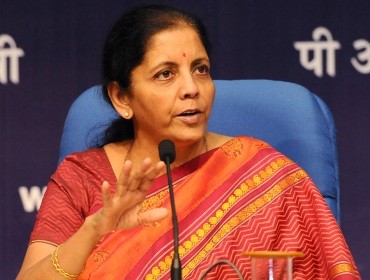
Ever since Finance Minister Nirmala Sitharaman burst onto the financial policy landscape, investors seem miffed with markets voting with their feet.
Yet, Sitharaman is unyielding. Her new economic doctrine - tax the super rich - is markedly different from advanced nations championing the neoliberal theory that cutting top income tax rates attracts the economic growth fairy.
Supposedly, reduced taxes incentivise citizens to work, earn and invest more, otherwise called the supply-side, trickle-down economics. The theory's inventor Arthur Laffer often claims, "When you tax something, you get less of it, and when you tax something less, you get more of it."
But Sitharaman's belief in this theory doesn't run deep. Instead, she and her party's logic is somewhat opposite. It takes money to make money. And higher taxation at the top makes up for the waivers given to those at the bottom.
Hence, the NDA government raised surcharge on income above Rs 2 crore, but extended exemption limit for income up to Rs 5 lakh per annum. Such arrangement may fly with mass voters, but is crushing the bull market, which simply loves Laffer's reasoning: A good tax system should try to make poor people rich, not rich people poor.
However, there's no conclusive evidence that trickle-down economics works the way it should. Rather, the bright idea broke the world. Ok that's an exaggeration. But suffice it to say that countries that deployed it didn't taste much success, but instead racked up billion-dollar deficits!
Take the US for instance. President Ronald Reagan gave the trickle-down theory a shot reducing taxes from 70 to 28 per cent, only to be partially rolled back by his successor George H W Bush, who gave Reagan's policy a slanderous moniker -- voodoo economics. UK's Margaret Thatcher, the most prominent Conservative politician post World War-II, progressively sliced rates from 83 to 40 per cent.
Though it did the trick initially, they were partly folded up after her ouster by her colleagues. Several other nations including Australia and Russia joined the global tax reduction frenzy reducing rates from an average 65 to 40 per cent, hoping to accelerate grwoth. US President Donald Trump is the latest votary, promising to please the rich despite conflicting evidence from within the country.
In 2012, the US State Kansas resorted to drastic tax cuts including junking the top tax bracket, but had to abandon it eventually having lost $700 million in tax revenue every year.
The ballooning deficits left Kansas in a financial crisis as economy and employment grew slower than the national average. Clearly, the supply-side theory failed to stimulate the economy, and was proof enough that tax cuts just don't pay for themselves.
A recent joint paper by Piketty, Saez and Stantcheva argues that defanging top taxes may have undesirable consequences. Why? The CEOs will put in efforts to increase their salary rather than improving their firms. Maybe, just maybe, they could be right.
This acknowledgement came from none other than America's super rich, who sent a missive urging 2020 US Presidential candidates to tax them more if they wish to improve inequality and climate change.
The 18 signatories include the who's who of US Inc such as billionaire investor George Soros, Facebook's co-founder Chris Hughes, and Molly Munger, daughter of billionaire investor Charlie Munger. "America has a moral, ethical and economic responsibility to tax our wealth more," they concluded.
Meanwhile, EU nations have a mix of both. While countries like France and Germany have steep tax slabs with the highest being in excess of 56 per cent, half-a-dozen economies follow a flat income tax rate. Ironically, five of those nations continue to be poor.
The bottomline is this. Despite attempts stretching across centuries, no country has been able to formulate an ideal tax policy with surgical precision. Unhelpfully, what works for one country, may prove disastrous for another. Clearly, for any nation, tax revenue is its meat, drinks and dessert and Sitharaman should be allowed time to test her theory.


.jpeg)

